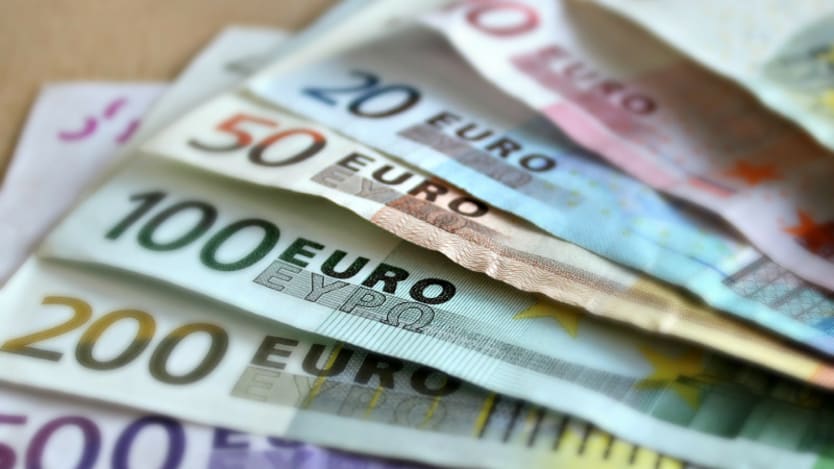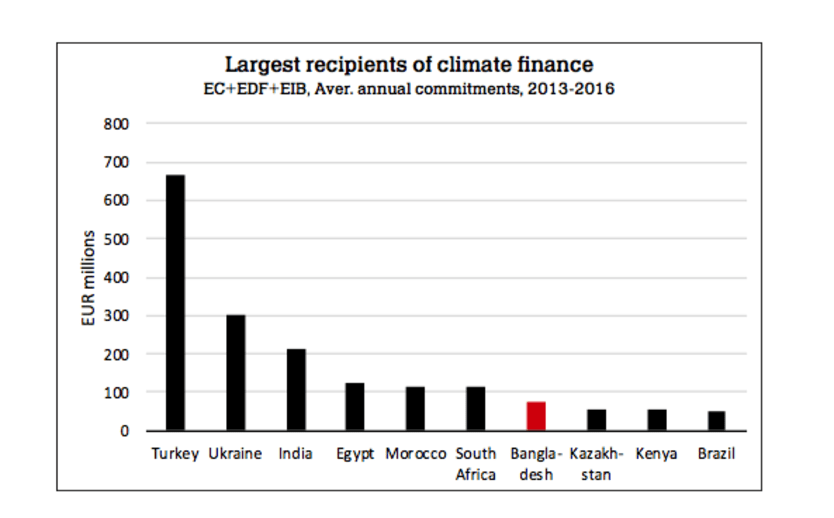
BRUSSELS — An analysis of European Union climate financing released Wednesday has raised questions about where the funds are going, as it emerged that Turkey was by far the biggest individual recipient.
The report, commissioned by the ACT Alliance EU, a church-based advocacy group, measured the combined funds from the European Commission, European Development Fund, and European Investment Bank that go toward tackling the causes and effects of climate change. It found that Turkey was by far the biggest recipient of climate financing from the EU institutions, receiving an average of 667 million euros ($823.7 million) per year between 2013 and 2016; followed by Ukraine, which received an annual average of 301 million euros ($371.5 million).
By contrast, least-developed countries received just 19 percent of the EU institutions’ climate assistance during the period covered. The only LDC among the top 10 recipients was Bangladesh, which received an annual average of 74 million euros ($91.3 million), largely through loans, which advocates also questioned.
In Turkey, ACT Alliance EU cited a metro expansion in Istanbul, which is receiving a 250 million euro ($310 million) loan from the EIB. The bank assesses the entirety of the loan as contributing to the fight against climate change, but Mattias Söderberg, senior advocacy adviser at ACT Alliance EU, questioned that decision.
“Railway is of course a good way to move people from cars to electrified transport, but it’s clearly not only beneficial from a climate change perspective, so it’s not fair to count it as 100 percent climate finance,” he said.

Speaking at the launch of the report, Etienne Coyette, head of sector for climate change at the commission’s development arm, DEVCO, said Turkey had received some of the funding under the Instrument for Pre-accession Assistance, aimed at states looking to join the EU.
“I can see it as good news that we have such an important share of funds to Turkey going to climate issues,” he said.
Support for LDCs
The authors found that most of the EU’s climate finance to the poorest countries comes from the European Commission and the EDF. Between 2013 and 2016, 17 percent of commission climate financing and 70 percent of the EDF’s total went to LDCs.
However, just 8 percent of the EIB contribution was distributed to LDCs, a figure that has barely increased since 2013 and remains below average for other multilateral development banks, the authors said. The bank also favored loans in almost all cases, in contrast to the commission and EDF, whose climate financing since 2010 was made up of 99 percent grants.
“Loans could play an important role [in climate adaptation and mitigation], but it is not fair to count the money which developing countries are expected to repay” as part of the EU’s climate financing, said Floris Faber, ACT Alliance EU director.
“This is in contradiction to what overseas assistance is meant to be. In this case, the agreed support becomes a bill, which poor people will have to pay,” he added.
ACT Alliance EU is also calling for more funds aimed at helping countries adapt to the effects of climate change, rather than mitigating the causes. The proportion of finance from the commission and EDF directed to adaptation measures was 55 percent in 2016, compared to 4 percent at the EIB.
Hans Peter Dejgaard, one of the consultants who prepared the report, told Devex he was impressed by how much the EDF allocates to resilience efforts in LDCs.
“The problem with poor countries and adaptation is that it’s difficult to find business cases for the private sector,” he said. “Who should invest in a community in Burkina Faso on a water project on resilience and adaptation? You can’t get a return on the loan.”
A spokesperson for the EIB said the bank did not neglect LDCs on climate finance. “In these countries a much bigger effort is made to partner with the commission and/or the member states to share the risks, provide capacity building and advisory services, and catalyze private investment,” she said. “Loans are our most direct means of financing, but we are also actively promoting guarantees and funds among other products.”
The way climate finance is counted means that “lending to adaptation reflects just the incremental cost of making projects more resilient to the expected climate impacts,” she said. “This often results in a low figure, which is not always reflective of the impact of the intervention, which can be substantial in terms of avoided losses and population resilience to such impacts, including avoided loss of human life.”
She added that the bank’s climate strategy included a clear intention to increase adaptation efforts. The EIB is aiming to see at least 35 percent of investments in developing countries go toward climate action by 2020, up from 27 percent in 2016, and the share of the bank’s climate action going to developing countries has already increased since the end-date of the report.
Coyette said his department, DEVCO, was proud of the proportion of its funding spent on adaptation, which is “the main challenge for our partner countries.”
Country contributions
The report also looked at climate financing contributions from individual EU member states, which amounted to 15.5 billion euros ($19.1 billion) in 2016, as reported to the U.N. Framework Convention on Climate Change.
Alongside contributions from the EU institutions, the bloc’s total climate financing has more than doubled over three years, from 9.5 billion euros ($11.7 billion) in 2013 to 20.2 billion euros ($25 billion) in 2016.
While the report found seven EU member states spent more than 0.05 percent of gross national income on climate finance in 2016 — including Luxembourg (0.35 percent), Germany (0.23 percent), and Norway and France (each at 0.13 percent) — 13 member states, mostly from southern and eastern Europe, gave less than 0.005 percent. Poland contributed just 5 million euros in climate finance in 2016, or 0.00057 percent of GNI.
Dejgaard said he found some of the numbers “a bit shocking.”
“So many countries are basically not paying climate finance,” he said.
Update, April 19, 2018: This story has been updated to clarify that non-EU countries in Europe and Turkey received 33 percent of climate finance from the European Union institutions between 2013 and 2016.








